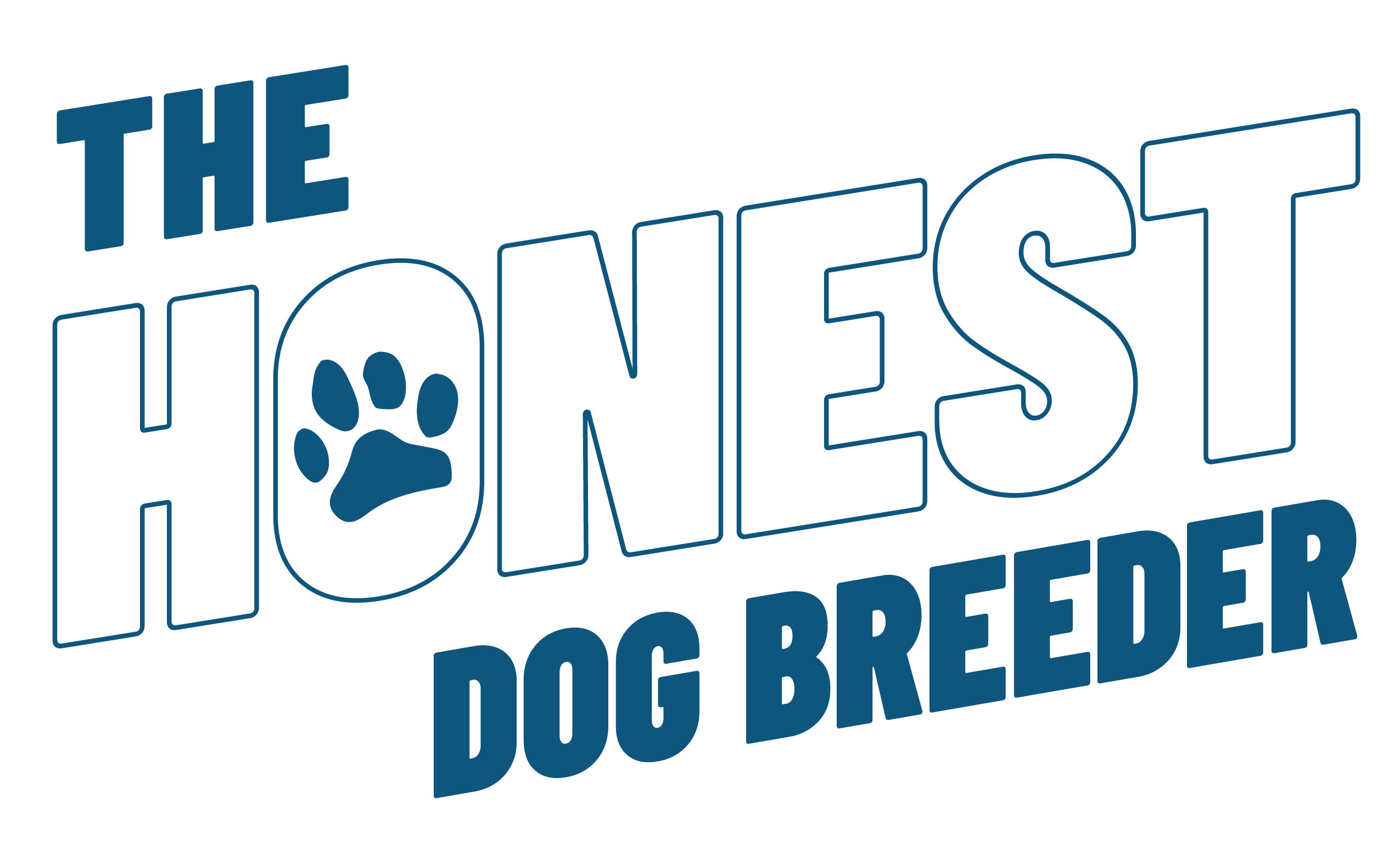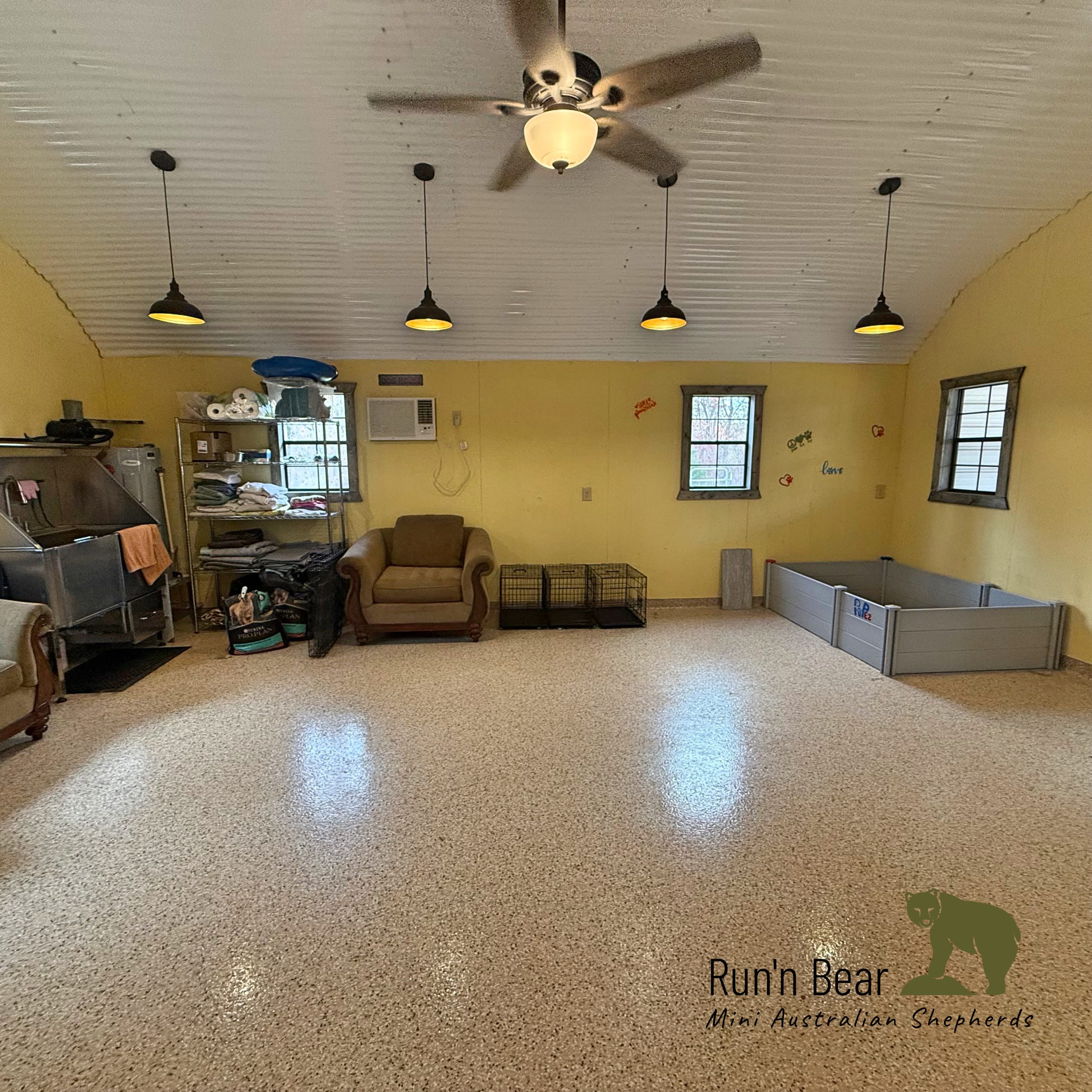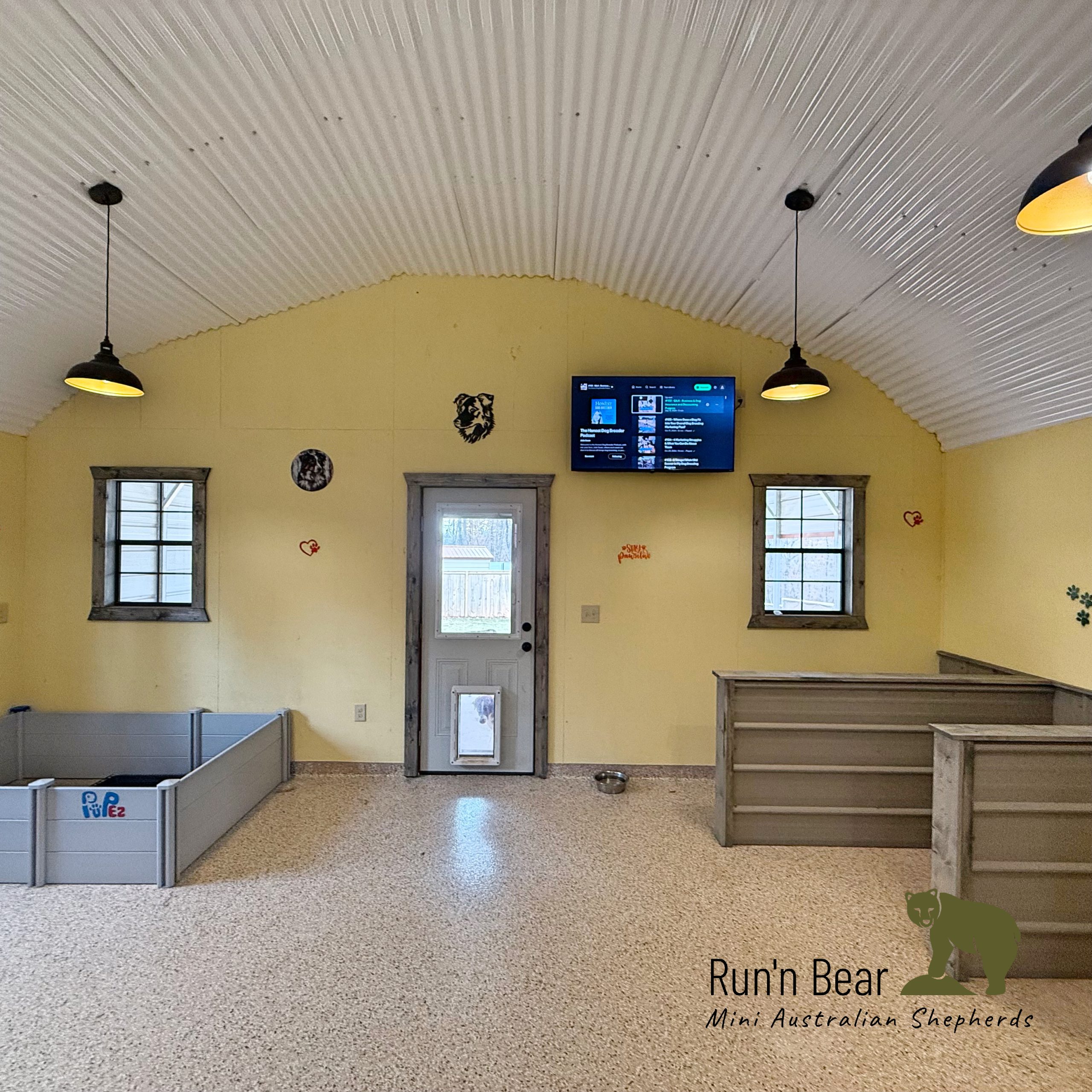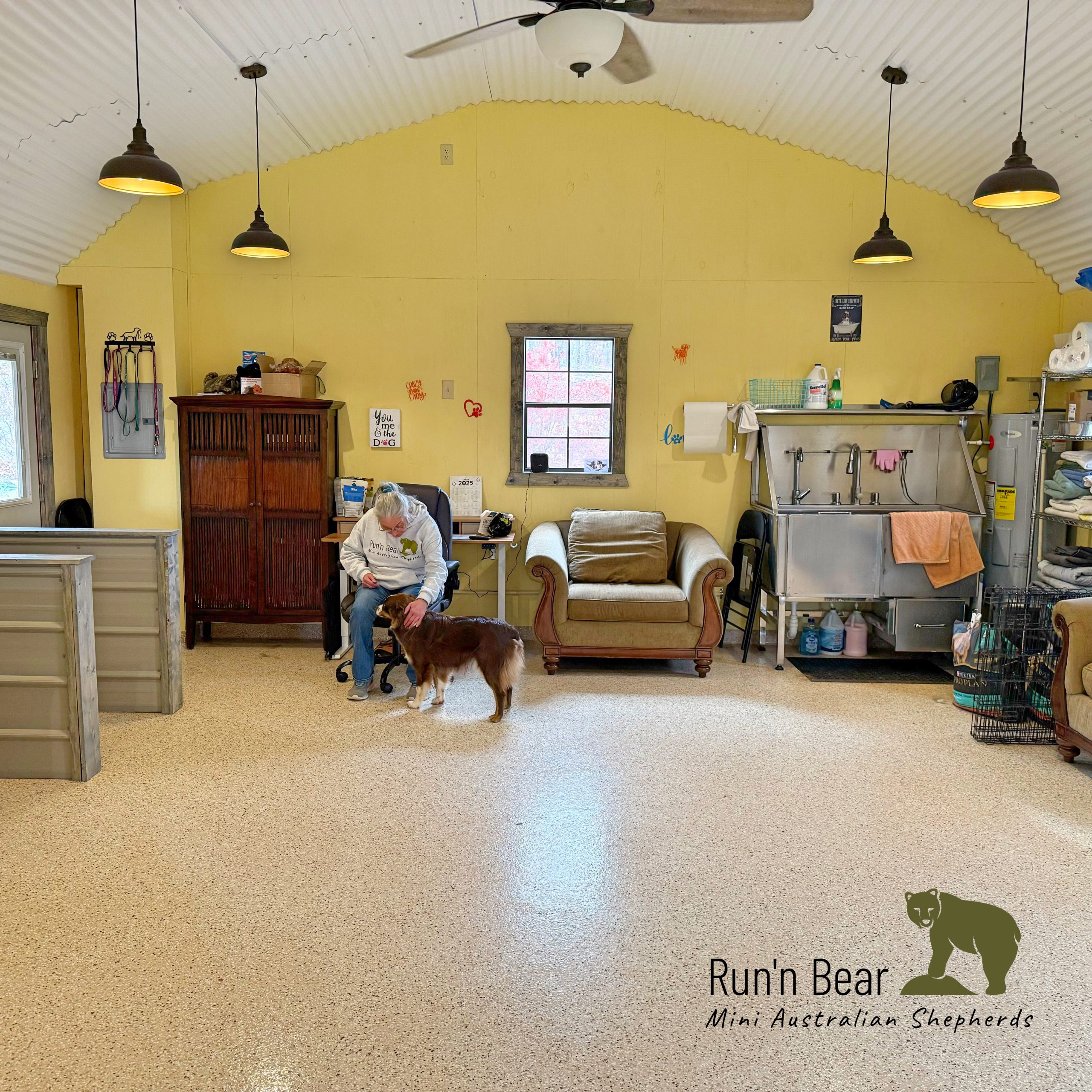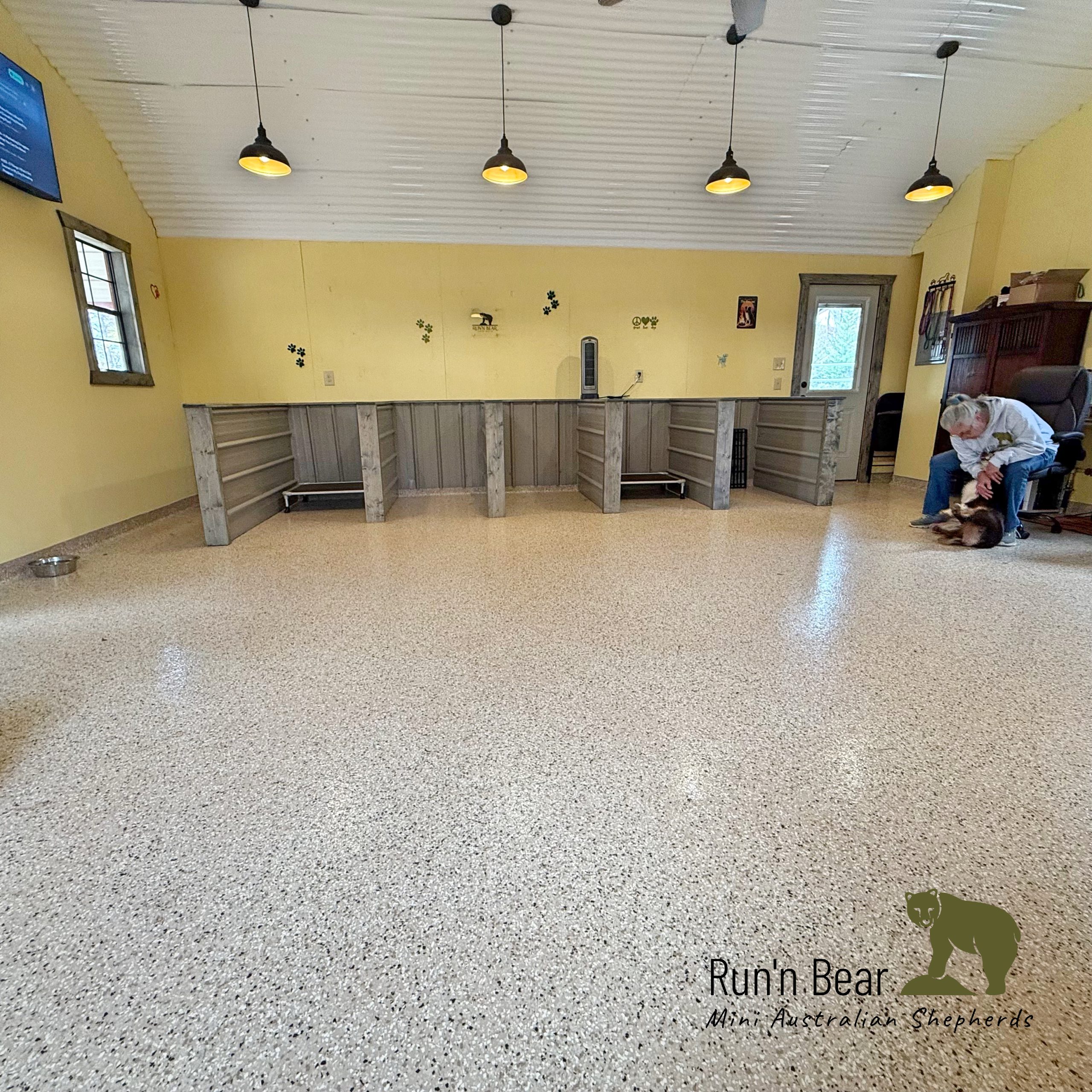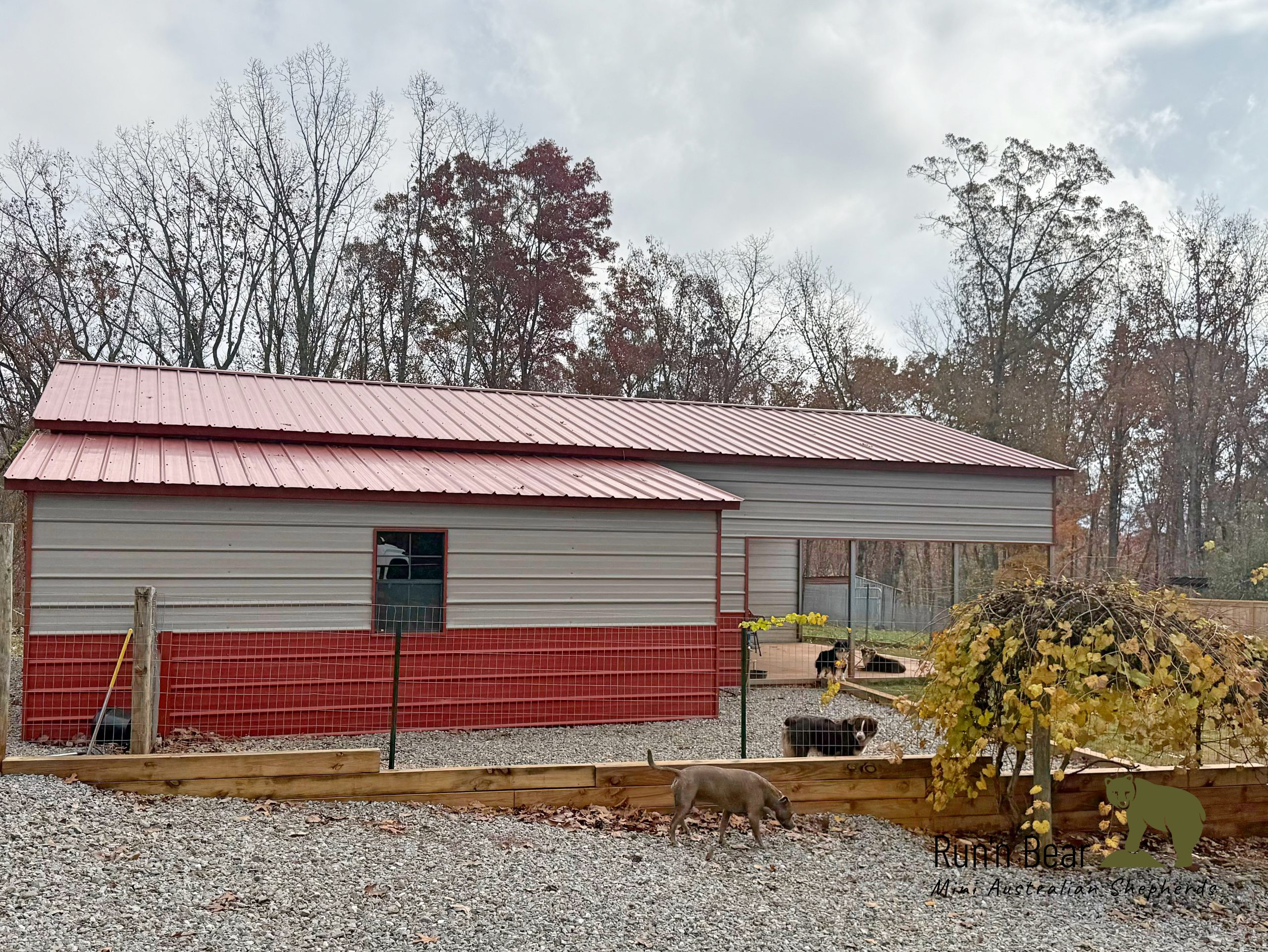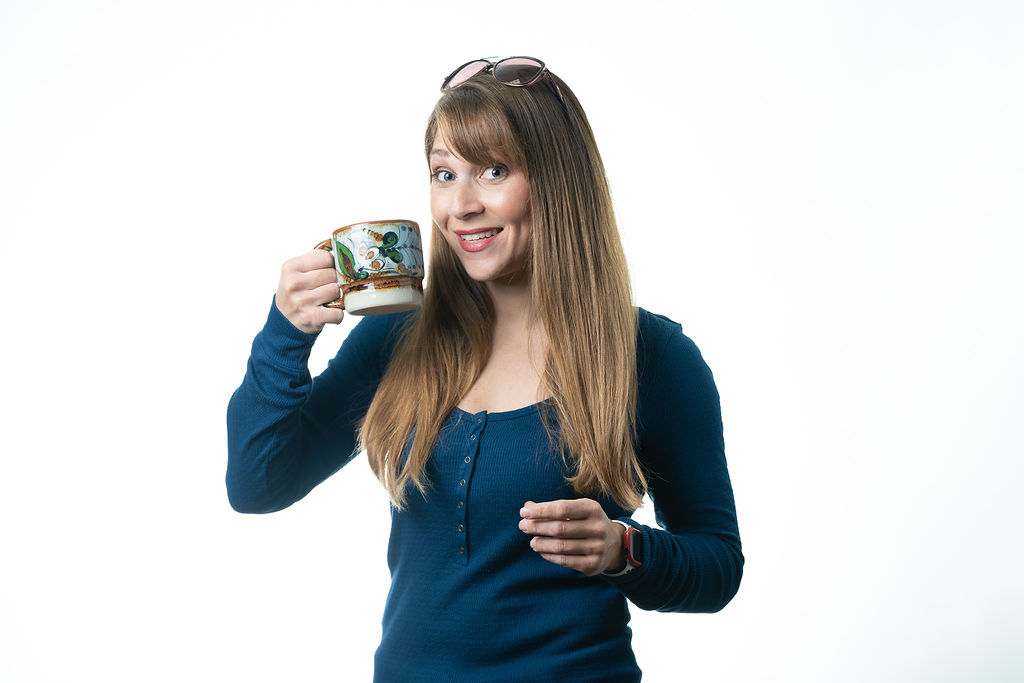The 12 Days of Breeders is a series of interviews conducted with members of the Dog Breeder Society who are doing innovative, creative, and inspiring things in their dog breeding business. In each of these interviews we cover challenges each breeder has encountered, and how they’ve overcome those challenges to find success in their breeding program. Join me for all twelve of these interviews for inspiration, and countless actionable tips you can use to overcome (or avoid) challenges in your own dog breeding program! You can check out all of the interviews in this series here.
Bill & Alice Collins and Run’n Bear Mini Australian Shepherds
Bill and his wife Alice recently built a beautiful facility for their breeding program. Bill is a flooring contractor and he shares what he did with designing and constructing his building to make clean up a dream! He also shares how he applied business principles from his contracting business to dog breeding and how it has placed their program a cut above. You’ll enjoy hearing how they delegate tasks and work together to create a great breeding program.
Check out photos of Bill & Alice’s new facility!
Transcript
Julie Swan | 0:00
Welcome to the Honest Dog Breeder podcast with me, your host Julie Swan. Where each week we dive in to discuss all things dog breeding so you can build a breeding business you love, producing dogs that fulfill their owners’ dreams. I believe you can have an honest dog breeding program that also pays the bills.
So throw those pods in your ears while you’re cleaning kennels, I’d love to join you. You guys are in for a treat today. Today we have Bill Collins of Run’n Bear Miniature Australian Shepherds.
Bill, thanks so much for coming in today and talking to us. So tell us, you were a flooring contractor, you are a flooring contractor, how in the world did you get into dog breeding?
Bill Collins | 0:41
Hey, thanks for having me Julie, I appreciate it. I got into dog breeding because of my wife, she told me to. So that’s how I got into dog breeding.
No, my wife, she doesn’t work, and that’s something she’s done in the past, dog breeding, and you know I did it because I wanted to support her, doing something that she enjoyed.
Julie Swan | 1:13
So she just kind of wanted to start breeding and then you were like, yeah okay, go ahead.
Bill Collins | 1:18
Yeah, okay, go ahead. Then we got puppy poop and pee in the basement and it’s smelling and I was like, okay we need to rethink this. What have I gotten myself into?
Julie Swan | 1:32
Yeah.
Bill Collins | 1:33
And you know by that time we’re attached to the dogs.
Julie Swan | 1:37
Right, can’t get rid of them, so you gotta figure out a way to make it happen.
Bill Collins | 1:41
So then you know, but before she actually had that litter, she told me we need to have a place to have them. So of course I said, yeah I should have listened to my wife. So we did buy a smaller building, you know like a 12 by 14.
But that still looked a little like a backyard breeder, I guess.
Julie Swan | 2:09
It wasn’t working for you? What did you end up using that building for? For all of your stuff, or?
Bill Collins | 2:14
No, right now we use the building as our maternity ward. So the females are separate from the other dogs, the mothers.
Julie Swan | 2:25
Yeah.
Bill Collins | 2:26
Because they don’t like other dogs around them.
Julie Swan | 2:29
No they need their break, that makes sense. And so is that, was that like a manufactured shed that you purchased, or did you build something?
Bill Collins | 2:35
Yes, manufactured shed, yes. And you know they stay in it, the puppies do, until they’re three weeks old. When they’re off their mother, more or less.
So then we move them in the kennel.
Julie Swan | 2:49
That makes sense, yeah. And so that was good, but then you mentioned, and I thought this was really interesting, you were telling me about how, you know, the appearance was really important to you, because you’d had some bad experiences with breeders.
Bill Collins | 3:07
Yes, after that first litter with my wife.
Julie Swan | 3:12
In the basement?
Bill Collins | 3:13
In the basement, yes.
I thought ok, this isn’t going to work, you know, because one thing, it didn’t look good, you know. We started off, I guess, as a backyard breeder, without knowing what a backyard breeder was. But you know, I told her we had to make some changes, make an investment in this business.
And she let me pretty much handle the business part. But what really got her and me also invested in doing the breeding, is because we were, we bought a couple of dogs that were, we found out did have problems.
Julie Swan | 4:09
And you bought these with the intention to breed, and then how did that happen?
Bill Collins | 4:13
With the intention of breeding, then we found out we couldn’t breed them, because they did have health issues. And they weren’t socialized at all. I mean, we still have the dogs, but we don’t breed them, we had them fixed.
And it’s like, everywhere we turn, it was like dishonest dog breeders. And it’s like, all they want to do is to sell a puppy, and they could care less about the puppy. And that’s wrong, you know, so many levels.
Julie Swan | 4:51
Yeah, I don’t want to dime out any in particular breeders. But what were some of the things that you experienced? I mean, other than the health concerns?
And then how did you notice the poor socialization? What was that like for you getting the dog?
Bill Collins | 5:04
The poor socialization, I flew up to Indiana to get a puppy for my wife. And the puppy was six months old. And it was like it had never seen another human being before till I got it.
And, you know, the dog has done a lot better. She’s come out of her shell with our other dogs, because our other dogs are really well socialized. But we also have another dog, Katie.
And she still has bad anxiety. She doesn’t like anyone except Alice. So, and you know, we had her spayed.
But she also has some health issues that we’ve had to deal with. So it’s just dogs that never should have been bred to begin with.
Julie Swan | 6:02
Yeah. And so for you, you were kind of like, we can do better.
Bill Collins | 6:07
We can do a lot better. Yeah. And that’s where after we had the first litter in the basement, we took a break and learned about DNA testing, learn about OFAI testing and hip testing.
Those are the main things with the Mini Aussies, the eyes and hips. But, you know, to make choices, because there’s, I don’t think there’s anything worse than buying a dog that’s unhealthy. And you’re attached to that dog.
And we have the means to pay for the medical care. But a lot of people don’t. They just want a dog that they can enjoy.
Julie Swan | 6:53
That’s why you go to a breeder. So you don’t have to have surprises.
Bill Collins | 6:57
Correct.
Julie Swan | 6:58
That’s what you think you’re getting from a breeder. And then, yeah.
Bill Collins | 7:04
There’s, I think there’s a big difference between professional breeders and backyard breeders.
Julie Swan | 7:09
And so what was your, because you even mentioned you felt like you may have started out sort of on the backyard breeder side of things.
Bill Collins | 7:16
Yes.
Julie Swan | 7:17
What do you see as, what would be your definition of backyard breeder versus professional?
Bill Collins | 7:23
Well, a backyard breeder, they may not have a full understanding of breed standards for what they’re breeding or genetic risk. They, you know, they may just be doing it for a hobby or to make some quick cash. And, you know, or they don’t have the ability to pay for proper care for healthy puppies.
Because it does, it does take money to be in the breeding business.
Julie Swan | 7:56
Well, there’s time invested in it. I think there’s this time invested in education and supporting your buyers, then trying to find good buyers for the puppies so that they go to a good home. There’s just so many things that you have to juggle and work with.
I always struggle because I don’t feel like you can do that. In essence, like you can’t do it halfway.
Bill Collins | 8:22
Correct.
Julie Swan | 8:23
It doesn’t feel right to me.
Bill Collins | 8:26
It takes a big commitment to be an ethical breeder. It does. And if you don’t, you’re not willing to make the commitment, I mean, don’t breed.
Julie Swan | 8:36
Yeah. And I think so many backyard breeders they really start out sort of like this uninformed optimism where they’re like, Oh, this will be easy. Oh, this is cool. Puppies are so cute.
They’ll just sell. It’s no work whatsoever. And it’s only eight weeks.
Yeah. And I think they just, it’s, so then they kind of get to, I think where you were at, where I was like, wow, this is definitely more than I originally anticipated.
Bill Collins | 9:08
Yeah, it is. And if, you know, since it was more, I mean, we, even this year, we didn’t breed till recently because we knew we had to build a facility. We needed to have a website and other things.
So I think it’s just making, if you make good business decisions and do it honestly, I mean, it’ll pay off in the future.
Julie Swan | 9:37
Yeah. I remember you told me, you said just do it with integrity and the money will always follow.
Bill Collins | 9:43
Yes.
Julie Swan | 9:44
And I think you’re right.
Bill Collins | 9:45
In any business, in any business.
Julie Swan | 9:49
Exactly. So you mentioned in yours, you had these bad experiences, you kind of got inspired. You said, okay, we can do better.
So then you went on to build this facility, right? This was your first step in the whole thing. Can you tell us about it, because you have a beautiful facility and I’m a little jealous.
Like I kind of brought my Bill in and I was like, hey, I want to do this on our floor. But yeah, tell us a little bit about the one room.
Bill Collins | 10:20
If his name is Bill, he’s got to be a great husband, right? He’ll build you this, you know? So, well, my wife wants a facility.
Now I want it to be the best, you know? So I’m very competitive, but, um, no, we built a, 30’ by 40’ facility. We have a concrete slab, heating and air, and water.
But, the main part is 22’ by 25’. Then we have a covered part that’s 22’ by 15’.
Julie Swan | 11:00
And so for people who are listening to that, that part extends over almost like a really tall porch, right?
Bill Collins | 11:07
Yes.
Julie Swan | 11:08
It continues the roof line, but it’s outside.
Bill Collins | 11:11
Yes. Yeah, just to help with the muddy paws, you know.
Julie Swan | 11:12
Can you tell people where you’re at, so they have an idea of your climate?
Bill Collins | 11:20
We’re in the North Georgia mountains.
Julie Swan | 11:30
So you have four seasons?
Bill Collins | 11:32
Yes, we have four seasons, summers aren’t that bad. But we also have 33 acres.
So the dogs are, they run everywhere, but we needed a way to keep the females that were in heat in a separate place. That was really driving my wife crazy. I mean, seriously, you know, worrying about going to get bred or with the wrong male or whatever.
So it’s mainly to keep dogs in, and keep dogs out, you know, the facility. Plus, we’ve had potential buyers come here and they just love it. You know, they’re impressed because it’s clean. You know, it’s nice.
Julie Swan | 12:16
Yeah.
Bill Collins | 12:17
And we do take precautions when people come, you know, as far as making sure their shoes are sanitized and they wear booties and all that stuff. That’s my wife does that.
Julie Swan | 12:32
I think it makes sense. That’s good. So that’s cool.
So if you could tell us a little bit, because I’m not, everybody’s going to be able to see, we’ll put some pictures for people because it’s so cool. And you have this like bright yellow paint too on the wall. It’s like very fun.
Bill Collins | 12:49
Yes. Yes. It was all my wife’s idea. And the main thing she wanted too, was the dog washing station, you know, cause she’s getting old.
She can’t get in the bathtub with the dogs. So she’ll hate that I said that. And also too, I mean, when you have that many dogs, it’s hard to go on vacation.
So at least the dogs are in a kennel with someone watching them.
Julie Swan | 13:21
Yeah. So if people are coming to take care of your dogs when you go on vacation, this makes it much easier.
Bill Collins | 13:26
Yes. Yes. A lot easier than dogs in and out of the house all the time.
Julie Swan | 13:32
Exactly. I think it is too. And it’s, I’ve noticed that like the cost to have somebody come out and take care of my dogs now that I have facilities, is considerably cheaper because it’s so much faster and easier.
So I don’t have to like give them like three pages of instructions.
Bill Collins | 13:52
We’ve done that.
Julie Swan | 13:55
So tell us a little bit on materials. Everybody wants to know on materials. So you have a metal exterior, which is fun because it’s just never have to do anything to it.
Concrete was underneath. And then what did you do for flooring? Because this is like my favorite part.
I’m just drooling over here.
Bill Collins | 14:12
We did an epoxy floor. The epoxy material itself costs around $2,000. So it’s a really good material.
Julie Swan | 14:26
And that’s $2,000 to cover around 500 square feet. Yeah. $2,000 for that epoxy.
Bill Collins | 14:33
It was probably around $30 a square foot, I guess. So maybe $1,500. Yes.
Julie Swan | 14:39
And that’s not labor, right? Because you know how to do all that.
Bill Collins | 14:42
Right, correct.
Julie Swan | 14:43
So that would be a little bit more. So I mean, for people who are in the contract world, probably expect double that for install.
Bill Collins | 14:49
Yes. You want something that’s also that’s resistant to urine. You know, that’s the main thing.
Julie Swan | 14:58
Would you consider that epoxy floor not porous?
Bill Collins | 15:02
It is not porous at all. No, I mean, it’s the top coat is like a urethane on top of it that protects it from UV light and from chemical spills. But also there’s, it’s not sand, but it’s like sand that you throw in it to keep it slip resistant.
Julie Swan | 15:27
So it’s a little bit of texture, but not so much that mopping is annoying.
Bill Collins | 15:31
Correct. Correct. Right.
Yes.
Julie Swan | 15:34
Those Home Depot epoxy floors with the chips. I had to clean puppy poop around those chips at one point in time, this was in my setup and I wanted to die. It took forever.
Bill Collins | 15:48
No, no, no, no. So you put the epoxy, then the chips, then the top coat that goes on seals the chips. So you don’t want that either.
So yeah, that’s.
Julie Swan | 16:01
Yeah. So this is the, this is a good one. So this has this coating system.
Oh, that’s perfect. And so you were also saying it’s not because porous is one thing like concrete, you know, urine can go into it a little bit, which is kind of annoying. Whereas non-porous won’t.
But also you’re saying, because urine is so caustic, like I’m seeing it on my metal kennels. It’s actually eating away. The acid is eating away at some of the metal and the finish.
So you’re saying this material is also resistant to that sort of, so if you missed a spot, it’s still good.
Bill Collins | 16:34
Right. Correct. Yes.
And also too, we ran it up the walls four inches.
Julie Swan | 16:39
Yeah. And it’s seamless, right?
Bill Collins | 16:41
Yes, it’s seamless. Yes.
So it’s really, it’s nice. I’m happy with it, but the main, it doesn’t matter if I’m happy with it or not, as long as Alice is happy with it, we’re good.
Julie Swan | 16:57
That’s good. And then you also use some vinyl. Do you like the vinyl inside?
You have it on some of the walls for where you have like dog, is it dog separation?
Bill Collins | 17:07
Oh, yes. The individual kennels. No, we actually use some metal siding that was left over from the construction.
I was able to repurpose that and put it inside there. So, and there it’s, I don’t know if we’ll ever put gates on it, but at least we feed the dogs separately.
Julie Swan | 17:32
Yeah.
Bill Collins | 17:32
You know, we have six different, six individual kennels built in, but yeah, they’re, they jump on the furniture.
Julie Swan | 17:44
I get it.
Bill Collins | 17:46
But that was also mainly for us when we travel.
Julie Swan | 17:51
Yeah.
Bill Collins | 17:51
They’ll be able to be fed easy.
Julie Swan | 17:54
Yeah, no, that’s so true. It’s very nice. Any other really cool things that you want to share that you guys did that have worked out great or anything you’d say maybe you would have done differently?
Bill Collins | 18:08
Well, we have internet here in the building, so my wife can sit here with the TV and listen to your podcast. But no, this is her she shed, she calls it, you know, she spends a lot of time here. So I had to, I had to make it nice for her.
Julie Swan | 18:34
So yeah, well, I love it. I love it. That’s perfect.
And then, all right, so here’s what really caught me off guard when you were telling your story, right? You go in and you tell me, my wife was doing this, it was wonderful. And then she had a hard time selling puppies, right?
Because the market shifted. And instead of you being like, I don’t know what her problem is, she needs to get rid of her dogs. You were like, I think I’ll help her.
It was like revolutionary. How did that go down? How did you get convinced to do all this and jump in?
Bill Collins | 19:08
I think it was more of self-preservation. I didn’t want a bunch of puppies around forever. And we all have our strengths and weaknesses, you know, and the list of things that she does is like 10 times more than me.
But, you know, I have some experience with marketing and customer service. So, I decided to help her with that. I more or less from the business side and she runs the puppies.
Yeah, she’s in charge of picking up poop. But she does a lot more than I do, I guess. But we’re able to sort of divide and conquer, you know, that makes it easier.
Julie Swan | 20:02
Yeah, I think it’s great. Well, you said she’s basically like a dog whisperer. She’s super talented.
Bill Collins | 20:07
Yes, all the locals call her when their dogs are sick.
Julie Swan | 20:12
That’s sweet though. You’re out in one of those areas too, where it is more rural, right?
Bill Collins | 20:17
Yeah, it’s more of a very rural area. But I have found that I’ve enjoyed talking to the prospective owners, and I’m able to sort of weed them out to begin with. Then I’ve set up the website, and the application process, and I handle the contracts. I do the stuff that I enjoy doing, but my wife doesn’t necessarily like to do.
Julie Swan | 20:55
Yeah, that’s a really good tag team.
Bill Collins | 20:58
Yes, and she handles all the support afterwards, you know, she’s getting texts and pictures almost every night from dog owners, and she likes that sort of thing.
Julie Swan | 21:10
Yeah, I love that. Nice. So, you made some changes in marketing, so what did you end up doing that has started to work?
Because I know you picked up the pace a lot the last few months.
Bill Collins | 21:23
Yes, I guess last spring decided we needed a facility, but also decided that I needed to learn a lot about the dog breeding business. So, I did a lot of Google research and finally came across the Dog Breeders Society and I joined it, and I, really just taking your advice on faith, that you knew what you were doing. Luckily, but no, we built a website, we went through the MasterClasses, you know, what needs to be on the website, then the Google reviews, you know, getting great suggestions from you.
So, we’re doing all these things, then start to see the fruits of that, people are calling us a lot more, we have a great website compared to other breeders and it’s clear, concise, got the FAQs. We, this is where I’m having to work, learning how to work on Kit, you know, and also working on HoneyBook. HoneyBook was a challenge for me to learn, but once I did learn and get it all set up, it’s made it so much easier to send contracts, keep track of different people, different people that fill out an application, where they’re at in the process. I feel like since we joined the Dog Breeders Society and learned more, that our breeding program is like a thousand times better and better than our competition.
Julie Swan | 23:28
Yeah, you, you’ve done so much work in there, I mean, I can see, I can just see how much.
Because, you know, we talk in the lives and you’re always working on something.
Bill Collins | 23:39
Yes, and, but a lot of the stuff that we’re working on, you only have to do it once. Then it’s pretty much automated, so I can’t see a light at the end of the tunnel, maybe in a couple of years, no, but, you know, maybe in the next few months, everything’s going to be fully automated as far as the stuff that makes us professional. Like the puppy email series, that’s a great idea, but actually learning about it, that’s hard to do, so if it wasn’t for you, we’d still be wanting to do it instead of doing it, you know, so.
Julie Swan | 24:26
Yeah, no, I get it, I’m glad it made it faster and easier for you to implement, and I think, did you find it fairly easy to customize everything to fit your breed, fit your needs?
Bill Collins | 24:36
Oh, yes, yes, yes, it’s very easy.
Julie Swan | 24:40
That’s good, yeah. I think one of the biggest things you were talking about is just that buyer support and education, and just giving them that better experience with a dog that they can trust what they’re getting. I think any breeder can focus on that goal, and you’re going to see results.
Bill Collins | 24:58
Right, it’s about building a brand, you know, building a professional brand, and I think the buyers feel very comfortable with us, I know they do, you know, they’re buying dogs from us. We’ve had three people who’ve adopted mini Aussies out of shelters, and they have bad anxiety problems. Well, they buy a dog from us to help their dog with a problem come out of its shell, and that’s because of the way Alice socializes our dogs. And I think that’s the biggest compliment we’ve gotten, people buying a dog from us to help their other mini Aussie.
Julie Swan | 25:49
Yeah, that’s super, super huge. Do you know any of Alice’s secrets that you can share?
Bill Collins | 25:56
Well, she’s just, she loves being with them, she’ll fall asleep in the whelping box with them.
Julie Swan | 26:09
Yeah, they’re loved from the moment they come out, yeah.
Bill Collins | 26:12
Alice, she’ll sleep in a recliner with them for a few days, you know, she’s crazy. But they’re great, I mean, but she does a lot of the ENS puppy socialization when they’re after a few days old. Then, when they move out here in the kennel, you know, she’s got all sorts of things. They’re walking on different types of flooring, tunnels, she’s potty training them, in their little, I don’t know what you call it, the little trays, you know.
Julie Swan | 26:53
Yeah, litter boxes or whatever.
Bill Collins | 26:55
Yeah, yeah, so, and most of the time, you know, at eight weeks, they’re not afraid of a lead, and they’re just, she does a good job with them.
Julie Swan | 27:11
They just sound like those puppies just know they’re loved. So you mentioned branding, that you thought the branding was really important. When you’re thinking about the branding, is that mostly because it makes them feel like they’re working with a professional business, or is it because speaking to them, or what really got you set on the branding?
Bill Collins | 27:35
Well, just a professional approach to dog breeding. I think it helps build trust with potential buyers and so you have credibility with buyers if you’re professional, and we get a lot of support from our veterinarian here in town. You know, he recommends us, and I think it’s very important to build your brand from the beginning as a professional.
Julie Swan | 28:09
Yeah, and any tips on something, anything you focused on that really worked well?
Bill Collins | 28:13
Yes.
Julie Swan | 28:15
I mean, I love your name, Run’n Bear.
Bill Collins | 28:18
Well, as far as the branding, our first dog, his name is Bear, Mini Aussie, but I think it’s how we treat customers as far as our brand. Alice treats them like family, you know, and if I know that Alice isn’t going to agree with somebody, I don’t even send her the application. And that, more or less, I don’t know, she’s building like a community, and it’s amazing since we had this litter, so many of our former buyers have been posting that we have new litter and stuff, and we never asked them to, and they’re probably going to get kicked off Facebook for posting the litter, but that’s not us, we didn’t do it. But it’s really neat that they’re very committed to us.
Julie Swan | 29:23
I think they feel taken care of, and I think people want to work with a business that they can trust will be there, they don’t have any question that your hearts in the right place when you guys are working with them. I know they’re paying maybe more, but it’s, but they know what they’re getting, and it’s worth it.
Bill Collins | 29:52
Correct, correct. Yes, and that’s, and we have no problem showing people the DNA results, the OFA testing of our dogs, you know, it’s no secret. I was actually thinking about maybe posting on the website, but I’m not sure about that yet. I may have to ask you about that later.
Julie Swan | 30:18
There’s pros and cons to both. Depends what your buyers care about, I guess. Sometimes they see that and they’re like, that’s cool.
What is that?
Bill Collins | 30:29
Well, I think, you know, healthy, well-socialized puppy. I think that should be the minimum of what a breeder produces.
Julie Swan | 30:42
No surprises, right. Yeah.
Bill Collins | 30:46
Yes.
Julie Swan | 30:47
I love how you’re so invested in this business. I can tell you obviously adore your wife and what she does. And it’s a great team you guys have.
But I’m still a little stuck. Like how did she turn you into like the converted husband who is this invested in the business? Do you have any secrets you can share?
Bill Collins | 31:12
Well, yeah, I guess I originally started as self-preservation. You know, Alice also did it mainly out of fear.
Julie Swan | 31:26
What do you mean?
Bill Collins | 31:31
No, she was spending so much time and I, you know, and I really felt bad for her too. Because, you know, there is a lot of work, and I don’t see how y’all do it, just one person breeding. And it gives us something to do together too.
You know, we disagree about a lot of things with the dogs, but, we also have a lot of successes together with the dogs. So we really enjoy that, but I don’t know how she roped me into it. I’m still trying to figure that out myself.
Julie Swan | 32:16
That’s fair. But at least you’re enjoying it, right? Like it’s fun, right?
When you get to a place where you have something started and you have a direction and you see maybe where you want to be and where you’re at. I think it’s fun to figure out how to get there.
Bill Collins | 32:31
Yes, it is. And, you know, she, I’m glad that I’m able to support her doing it, because she supported me for a lot of years. So I felt like, if this is something she wants to do, I need to support her.
And I just didn’t realize I’d be doing so much work, but.
Julie Swan | 32:53
Right?
Bill Collins | 32:55
I love her. I love her.
Julie Swan | 32:58
And I mean, I understand you probably got a little bit of savings on the building because you’re, you have some contacts yourself. You probably did the floor yourself. And I know you said your son helped a little.
Bill Collins | 33:09
Yes.
Julie Swan | 33:10
But ultimately you’ll be in which year in 2025? Was this your third year?
Bill Collins | 33:17
This will be our third year. Yes.
Julie Swan | 33:19
And you’ll be in the black. It’s pretty set in stone. You’ll be in the black for the year.
Bill Collins | 33:23
Oh, yes. Yes.
Julie Swan | 33:25
Right. And that’s even including buying a building and putting it up.
Bill Collins | 33:28
Correct. Yes.
Julie Swan | 33:29
I really think, you know, it’s, I think it’s very doable. It’s very doable.
Bill Collins | 33:33
Oh, yes, it is. And, you know, like I say, the biggest problem for us was learning the business side of it, and that’s where we were stuck until last spring, when we joined the Dog Breeder Society, because, how to build a website, how to do all these other things to be professional.
There’s really not a class you can take for how to do this.
Julie Swan | 34:07
Well, very few people are like, I want to start a business. Let’s do dog breeding. But a lot of people are like, I want to work with dogs and breed dogs.
And then that turns into a business. Like, I don’t see very many times when my business of choice. Yeah, no.
Bill Collins | 34:26
Yeah, well, it was our business of choice. But then we had to learn how to operate the business.
Julie Swan | 34:32
It was like an activity of choice, right? She loved the dog breeding. She loves the dogs.
Like, that’s so obvious. And you love her being happy. So that works out great.
But I think you’re right. There’s another piece to it.
Where kind of like we were talking about with the backyard breeders and the hobby breeders. There’s just not as much intentionality with them. That really holds back.
The business side actually affects your ability to find the right buyers and therefore your dogs going to the best homes.
Bill Collins | 35:05
Correct. Correct. Yes.
Julie Swan | 35:08
I know it can be boring. Could be fun.
Bill Collins | 35:10
Yes. Well, I mean, it’s, you want the dog to go to a great home, to someone where the dog will be happy, and the owners will be happy. And learning how to match buyers with puppies, I think is crucial that you know, for the sake of the puppy, you know, learning this ideal puppy buyer. I mean, who we should be targeting and why.
I mean, it’s for the health of the dog. You know, it’s for the happiness of the dog.
Julie Swan | 35:54
I agree.
Bill Collins | 35:56
That’s the most important thing we’ve had to learn. And that’s why we say no to people, not only because Alice wouldn’t like them, but also, too, they wouldn’t be a good fit.
Julie Swan | 36:11
Right. They’ll have a harder time with the dog. How do you help people no when they apply for a dog?
And you’re like, maybe not.
Bill Collins | 36:17
I got no problem saying no. No, no. And, you know, you know it. If a guy, usually it’s men that I say no to, because they’re sort of wishy-washy, and they don’t have their wife’s permission or girlfriend’s permission.
They never talk about it, they’re just I’m just gonna do it. Like, no. And sometimes many Aussies are sort of popular, like some other breeds, and some people just want them for Instagram or TikTok dog. And that doesn’t work either.
Julie Swan | 37:01
I mean, they’re so cute, like, and you do. Oh, my gosh, how many companies take some form of Australian Shepherd for their marketing, because they’re just, they’re such pretty dogs.
Bill Collins | 37:12
Yes. And our dogs, they belong more with people who, you know, have the time. And they’re really, it’s like a companion almost, because they’re so intelligent, the Mini Aussies, and they’re very loyal.
But, you know, a lot of people, I guess, are looking for a dog as a social status or something. And those I have easy time saying no.
Julie Swan | 37:47
That’s just not gonna work. Yeah. I do notice, when I have people where I’m like, just tell me what you’re looking for in a dog and they can’t get off the appearance. You’re like, okay, so what about what you might want to do with that dog?
And they’re like, well, we’re gonna have it as a pet. Great. Anything else you could share?
Yeah, it’s like, it’s painful.
Bill Collins | 38:12
Right? Well, it’s easy. You know, I want a blue Merle with two blue eyes.
Why? Why? Why?
Julie Swan | 38:22
It matches my house and my decor.
Bill Collins | 38:25
Yeah, exactly. Those, that doesn’t work.
Julie Swan | 38:28
So that makes sense. You just tell them that it’s just not a good, I don’t think our dogs will be a good fit. Is that what you’d say?
Bill Collins | 38:35
Yes.
Julie Swan | 38:36
Yeah.
Bill Collins | 38:38
Yes.
Julie Swan | 38:42
People, I know they’re entertaining.
Bill Collins | 38:44
Yeah.
Julie Swan | 38:45
Any advice for new breeders jumping in, or anything you wish you would have done sooner, or that you’re super glad you did do or anything along those lines?
Bill Collins | 38:56
My advice would be to learn as much as possible. I mean, the dumbest person in the room is the person that knows everything, right? So, I mean, and there’s so much to learn, but just learn as much as possible far as the website, learn about your breed, the best breeding practices, get a basic knowledge of animal genetics.
You know, what are the problems? What common health issues are there in your breed?
And, you know, I think a website is important, but I didn’t want to pay someone to build it. I didn’t want to pay someone to update it. You know, whenever we had a puppy that was for sale or sold.
So, and it’s easy now to build websites compared to 10 or two years ago.
Julie Swan | 40:05
Right.
Bill Collins | 40:06
So, you know, if I can do it, anybody can do it.
But, you know, learn about that, learn how to make a website. Google. I mean, we’re learning a lot now about SEO and blogs.
We’re starting a blog. It’s just ways to get found. You know, how do you get found?
You got the best looking, the greatest puppy on earth, but if no one knows it, what does it mean? So, there’s a lot to learn about getting found, and there are dog reseller websites, but a lot of those are scams. You got to be careful.
Julie Swan | 40:57
Yeah. I find a lot of them are a good way to get your name out there a little bit, like just in the beginning to get a little bit of traffic, get some dogs sold. And then I think most breeders around years two, three, four can pretty much move away from all that and just stick with organic traffic has been my experience.
And I, I see that already happening with you.
Bill Collins | 41:20
Yes. I mean, we started out AKC Marketplace and Good Dog. But now, I don’t see us needing to list those next spring because we’re getting a list of buyers now a waitlist.
And that’s the, I love it when the litters sold before it comes.
Julie Swan | 41:50
No problem. Yeah.
Bill Collins | 41:50
So that’s the goal as far as the business side, my part is to get deposits on puppies, get them sold, get the buyers connected with us before they’re born.
Julie Swan | 42:09
So perfect. Well, thank you so much for taking the time to tell your story today and share your beautiful building with us. And yeah, I’m like super jealous.
I know poor Bill has, my Bill, has no idea what he’s going to get into. When he gets to see these.
Bill Collins | 42:28
If you just nag him enough, eventually he’ll do it. Okay. That works for me.
Okay. Just nag them enough. I told you we needed a building.
Julie Swan | 42:41
I’ll just move all the puppies to our bedroom. He’ll make it really fast.
Bill Collins | 42:44
Yes. That works every time.
Julie Swan | 42:50
Thank you so much.
Bill Collins | 42:52
Well, thank you. I enjoyed it.
Show Notes
Referenced Links
-
- Learn more & Join the Dog Breeder Society
- Check out the MasterClasses Bill mentions in this episodes:
- Check out Run’n Bear Mini Aussies
